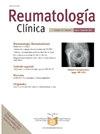Mepolizumab对嗜酸性肉芽肿合并多血管炎患者的疗效和安全性:来自西班牙风湿病部门回顾性多中心登记的数据
IF 1.2
Q4 RHEUMATOLOGY
引用次数: 0
摘要
目的:嗜酸性肉芽肿病合并多血管炎(EGPA)是一种主要由嗜酸性粒细胞介导的anca相关性血管炎。一项随机对照试验显示,Mepolizumab (MPZ)可减少外周血和组织中嗜酸性粒细胞的绝对数量,并已证明在维持EGPA方面有效。本研究的目的是描述MPZ在EGPA临床实践中的应用。方法对西班牙13个风湿病科室接受MPZ治疗EGPA患者的临床特点、病程、缓解率、结局和不良反应进行描述性、回顾性和比较分析。结果共纳入30例经MPZ治疗的EGPA患者。多达19例患者需要至少同时使用一种免疫抑制剂。平均随访16个月。MPZ的使用降低了伯明翰血管炎活动评分(BVAS)的中位数,以及c反应蛋白和嗜酸性粒细胞的平均水平。此外,所需糖皮质激素(GC)的中位剂量在79.3%的患者中减少,在57.1%的患者中完全停用。有趣的是,27例(90%)患者也计算了中位血管炎损伤指数(VDI),并保持稳定(mpz前3 [0-12],mpz后3[0-12])。所有患者在治疗过程中均未发生严重不良反应、局部反应和严重感染。结论MPZ在EGPA中实际应用的数据表明,该药疗效好,安全性好,可减少对糖皮质激素的依赖甚至完全戒断。此外,它似乎可以防止与该疾病相关的有机损伤进展。本文章由计算机程序翻译,如有差异,请以英文原文为准。
Mepolizumab efficacy and safety in patients with eosinophilic granulomatosis with polyangiitis in real practice: Data from a Spanish retrospective multicentric register from Rheumatology departments
Objectives
Eosinophilic granulomatosis with polyangiitis (EGPA) is a type of ANCA-associated vasculitis mostly mediated by eosinophils. Mepolizumab (MPZ) reduces the absolute number of eosinophils in the peripheral blood and tissues and has proven efficacy in the maintenance of EGPA, as shown in a randomized controlled trial. The aim of this study is to describe the use of MPZ in EGPA in real clinical practice.
Methods
This is a descriptive, retrospective and comparative analysis of the clinical features, course, response rates, outcomes and adverse effects of patients receiving MPZ for EGPA in thirteen Spanish Rheumatology departments.
Results
A total of 30 EGPA patients treated with MPZ were included in the analysis. Up to 19 patients needed at least one concomitant immunosuppressant. The mean follow-up was 16 months. The use of MPZ reduced the median Birmingham Vasculitis Activity Score (BVAS), as well as the mean C-reactive protein and the levels of eosinophils. In addition, the median dose of glucocorticoids (GC) required was reduced in 79.3% of the patients and was completely suspended in 57.1%. Interestingly, the median Vasculitis Damage Index (VDI) was also calculated in 27 patients (90%), and remained stable (3 [0–12] pre-MPZ and 3 [0–12] post-MPZ). None of the patients suffered severe adverse effect, local reactions or serious infections during the treatment.
Conclusions
Our data on the real practice use of MPZ in EGPA suggests that this drug has good efficacy, is safe and reduces the dependence on glucocorticoids or even their complete withdrawal. Furthermore, it appears to prevent the organic damage progression associated with this disease.
求助全文
通过发布文献求助,成功后即可免费获取论文全文。
去求助
来源期刊

Reumatologia Clinica
RHEUMATOLOGY-
CiteScore
2.40
自引率
6.70%
发文量
105
审稿时长
54 days
期刊介绍:
Una gran revista para cubrir eficazmente las necesidades de conocimientos en una patología de etiología, expresividad clínica y tratamiento tan amplios. Además es La Publicación Oficial de la Sociedad Española de Reumatología y del Colegio Mexicano de Reumatología y está incluida en los más prestigiosos índices de referencia en medicina.
 求助内容:
求助内容: 应助结果提醒方式:
应助结果提醒方式:


